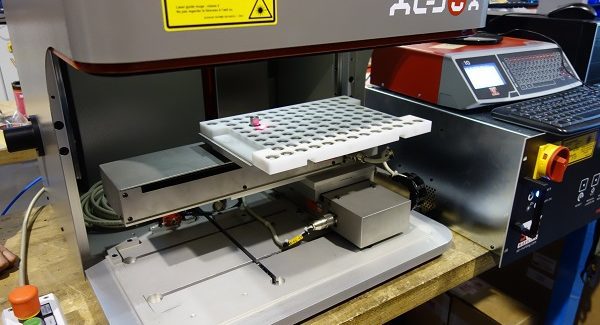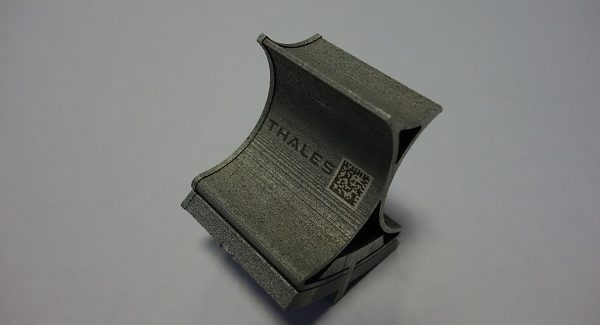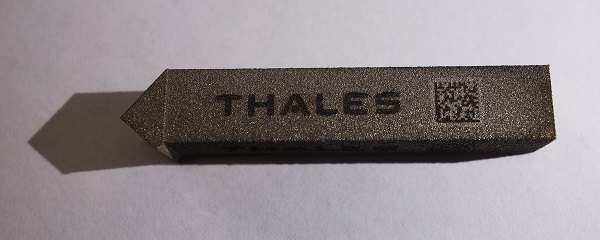How to Mark Parts Made by Additive Manufacturing
In the hyper-competitive aerospace market, metal 3D printing is perfect for manufacturing complex aluminum and titanium parts with curves, holes or cavities in small runs or on a one-off basis. But industry standards impose high quality markings on aircraft components for traceability. How will suppliers of printed parts meet these standards?
Posted: September 6, 2017
Metal additive manufacturing is a 3D printing technology that creates parts from scratch by using laser or electron beam systems to successively layer metallic material into a complete assembly, or to add functionalities to an existing part. In stark contrast to conventional machining processes that subtract metal to shape a part, metal 3D printing adds metal to build complex part configurations that often cannot be matched using conventional machining processes. This saves material costs and opens new perspectives for producing very small components or parts with highly complex geometric shapes for mass production or prototyping.
Metal additive manufacturing is particularly cost effective when using materials such as chromium cobalt (for medical or dental prostheses), ceramics (for military and defense applications), and aluminum or titanium (for aerospace applications). This is precisely why the hyper-competitive aerospace market sector invests the most in developing metal 3D printing technology: the process makes it possible for contract suppliers who are early adopters to bid competitively on producing small series of technically complex components or parts with significant weight loss and economic benefits that include shortened development time and optimized quantity of raw material.
Additive manufacturing provides real benefits for space-borne components by allowing the design and manufacture of single-piece structures, as opposed to a conventional assembly of several different parts to form a structure. Metal 3D printing also expands design freedom and means the absence of tooling, making it the perfect technology for complex parts with curves, holes or cavities that are produced in small runs or on a one-off basis.
Here’s the catch: aerospace industry standards DT 05-89, JES 131, XP Pr EN9132, and ATA SPEC 200 impose high quality markings on aircraft components for traceability. How will suppliers meet these standards?
In their new competence center in Morocco, Thales Alenia Space (Cannes, France) develops parts with metal 3D printing that are mainly made of aluminum and titanium. They ensure part traceability by marking datamatrix codes on these components using a versatile XL-Box laser marking workstation with a 22.44 in x 22.20 in (570 mm x 564 mm) work area to accommodate their larger-sized parts. Constructed of solid steel, this ergonomic and compact (25.71 in / 653 mm wide) machine enables the operator to work comfortably with an automatic and wide opening on three sides for loading/unloading parts to be marked. Easy to operate, even for users with minimal training in laser technology, the machine is equipped with a pneumatically-powered, intuitively secure door that automatically locks when the cycle starts and opens when the marking is finished. Operated with the push of a button, it’s a smooth action entry that allows access on all three sides and is equipped with a large viewing window.
During production, the “smart” Z-axis operates on a 9-1/4 in (235 mm) motorized system. With the additional help of two red focal pointers, focusing a precise mark is simple. The machine is equipped with a high powered, pulsed-wave 20 watt or 50 watt ytterbium-doped fiber laser that produces shallow or deep markings of alphanumeric codes, barcodes, and 2D Data Matric codes on all metals and some plastics. Its proprietary, user-friendly SIC LASER PC software can be run using Windows on any PC, and offers multiple configuration options. This robust system, which operates with reduced maintenance, provides Thales with an economic advantage when competing for aerospace work.


















